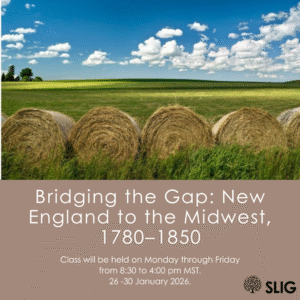Blog
Bridging the Gap: New England to the Midwest, 1780–1850
- August 28, 2025
- Posted by: Melody Daisson
- Category: Uncategorized

Have you ever hit a brick wall trying to trace your ancestor from Ohio back to their mysterious New England origins? Do you find yourself puzzled by the scattered trail of records as your family “moved west” into the wilderness? What if you could finally understand the historical forces—from the Northwest Territory’s development to the Second Great Awakening—that drove your ancestors to leave everything behind and venture into the unknown frontier?
A Revolutionary Approach to Family History
Welcome to “Bridging the Gap: New England to the Midwest, 1780–1850” – a popular SLIG course designed to master the complex challenges of tracing families during one of America’s most dynamic periods of westward expansion, when fewer detailed records were created and massive migration waves reshaped the nation.
This comprehensive course focuses on strategies and records for tracing families from New England to the Midwest between 1780 and 1850, grounded in the rich historical context of this vibrant period. As our ancestors explored the wilderness before them, the rapid economic, social, and territorial expansions of the Federal period created both opportunities and genealogical challenges that require specialized research techniques.
What Makes This Course Unique
Rather than struggling with scattered migration trails and missing records, you’ll master systematic approaches to westward migration research through three essential areas:
- Historical Context Mastery: Understanding the Northwest Territory development, New York’s land companies, the Louisiana Purchase, the Second Great Awakening, and the War of 1812 as driving forces behind family movements
- Strategic Record Navigation: Key New England and Midwestern sources, migration patterns, manuscript materials, military records, and land and property acquisition documents
- Advanced Tracing Techniques: Case studies demonstrating proven methods to connect Midwestern families to their New England roots, with a specific focus on families passing through New York, Pennsylvania, and Ohio
Did your ancestor leave Massachusetts for the Ohio frontier in 1820? Through hands-on case studies and historical analysis, you’ll learn to identify the economic opportunities, religious movements, or land policies that motivated their journey while discovering the often-overlooked records that document their path westward.
You’ll become a detective of migration patterns, learning to read the historical landscape that shaped your ancestors’ decisions and discovering the manuscript collections, land records, and military documents that hold the keys to bridging those frustrating genealogical gaps.
Meet Your Course Coordinator
- Joshua Taylor is a nationally known genealogical researcher and speaker who serves as President of the New York Genealogical & Biographical Society (NYG&B) and course coordinator at the Salt Lake Institute of Genealogy (SLIG). He holds an MLS (Archival Management) and an MA (History) from Simmons College and has been recognized with the Rubincam Youth Award from the National Genealogical Society, the Award of Merit from the Federation of Genealogical Societies, and was named a Fellow of the Utah Genealogical Association. Joshua has been a featured genealogist on Who Do You Think You Are? and host of the PBS series Genealogy Roadshow, bringing deep expertise in archival research and historical context to migration studies.
Meet Your Expert Instructors
Annette Burke Lyttle, CG® owns Heritage Detective, LLC and is past president of the Association of Professional Genealogists. She is a course coordinator for the Salt Lake Institute of Genealogy and the British Institute, and editor of The Florida Genealogist. Annette specializes in helping people uncover and share their family stories through research, education, and writing, with particular expertise in Quaker ancestors and ancestral migrations in the U.S.
Rick Sayre, CG®, CGLSM, FUGA, is a long-time genealogical researcher and instructor who coordinated and taught courses at the Institute of Genealogy and Historical Research (IGHR) from 2003 to 2017. He co-coordinates advanced land courses at the Salt Lake Institute of Genealogy (SLIG) and the Genealogical Research Institute of Pittsburgh (GRIP). He is an instructor at the Genealogical Institute on Federal Records. Rick’s expertise includes National Archives records, land records, federal land law, military records, and government documents—essential skills for tracing families through territorial expansion and federal land acquisition during the 1780-1850 migration period.
Judy G. Russell, CG®, CGL℠, FUGA, The Legal Genealogist®, is a genealogist with a law degree who holds a bachelor’s degree from George Washington University and a law degree from Rutgers School of Law–Newark. Before retirement, she worked as a federal prosecutor, defense attorney, and adjunct law school faculty member for over 20 years. As an internationally known lecturer and course coordinator at genealogical institutes, she specializes in the intersection of law and family history—crucial for understanding territorial law, land patents, probate records, and legal documents that governed westward migration. She received the 2017 National Genealogical Society Quarterly Award of Excellence and was named a Fellow of the Utah Genealogical Association in 2025.
Ready to Begin Your Journey?
This isn’t just another genealogy course—it’s your pathway to understanding the great American migration story with your ancestors as the pioneering characters. You’ll gain the historical knowledge and research strategies needed to bridge those challenging gaps between New England origins and Midwestern destinations during America’s transformative early decades.
